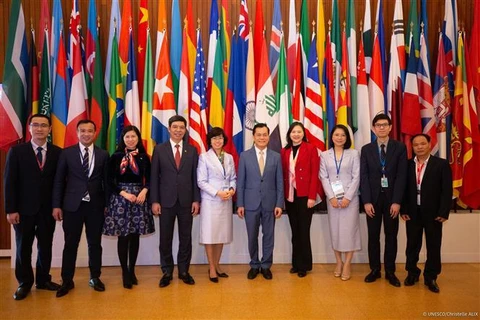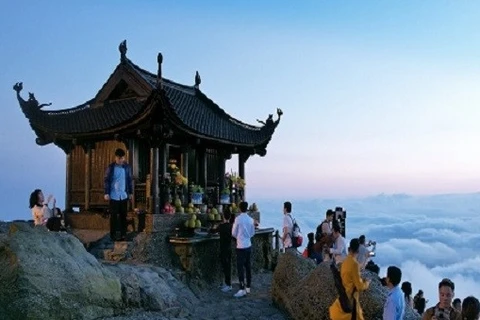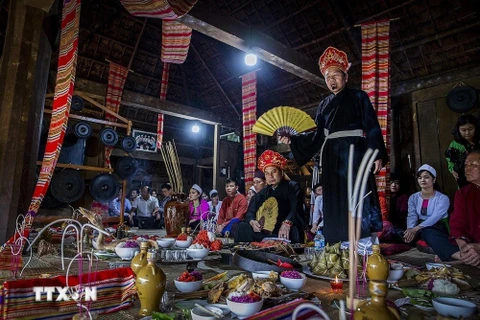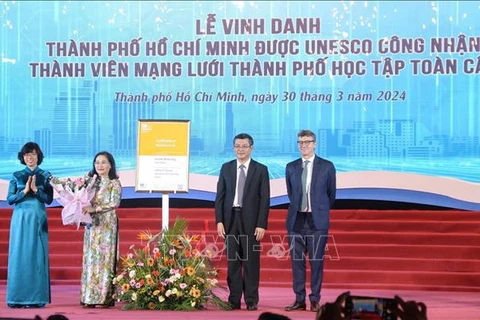Cao Bang (VNA) – The 8th symposium of the Asia Pacific Geoparks Network (APGN), slated for this September, is expected to help promote tourism in the northern mountainous province of Cao Bang.
The biennial symposium, to be held by the Cao Bang People's Committee and the Vietnam National Commission for UNESCO from September 7 to 15, will attract about 800 - 1,000 international and domestic delegates.
It will include meetings of the UNESCO Global Geopark Council to evaluate and re-evaluate dossiers, a meeting of the APGN Cordination Committee and Advisory Committee, general and thematic seminars, bilateral meetings between regional geoparks, cultural and artistic performances, exhibitions, along with booths for introducing Cao Bang’s tourism to delegates.
Vi Tran Thuy, Deputy Director of the Management Board of the Non Nuoc Cao Bang UNESCO Global Geopark, said the board has proposed the provincial Department of Culture, Sports and Tourism and the provincial People’s Committee establish an advisory board, a scientific council, subcommittees, and supporting groups to prepare for the event organisation. It has also coordinated with relevant departments and units to build a volunteer and collaborator training plan.
The management board has also worked with UNESCO experts to develop a registration portal and a symposium management software in English and Vietnamese for delegates to register their attendance and submit reports.
Located in the north of Vietnam, 300km from Hanoi, Non Nuoc Cao Bang was recognised as a UNESCO global geopark in 2018. It covers 3,000sq.km and is home to nine ethnic groups, including Tay, Nung, Mong, Dao, and San Chay.
The geopark is an exceptional territory which offers insights into the history of the planet across more than 500 million years through protected sites. Fossils, marine sediment, volcanic and plutonic rocks and minerals are witness to the remarkable evolution and changes of the earth, and they constitute an exceptional geological heritage.
It is also a land of tangible and intangible cultural heritage sites and special historical monuments. The area is also well-known for its high biological diversity with abundant endemic plant and animal species and ecosystems.
Cao Bang province is also renowned for its many scenic attractions, such as the Phia Oac Ecotourism Area, Phia Den, the Thang Hen Lake cluster, Nguom Ngao Cave, and especially Ban Gioc Waterfall, which was once voted one of the four most majestic and beautiful border waterfalls in the world./.
The biennial symposium, to be held by the Cao Bang People's Committee and the Vietnam National Commission for UNESCO from September 7 to 15, will attract about 800 - 1,000 international and domestic delegates.
It will include meetings of the UNESCO Global Geopark Council to evaluate and re-evaluate dossiers, a meeting of the APGN Cordination Committee and Advisory Committee, general and thematic seminars, bilateral meetings between regional geoparks, cultural and artistic performances, exhibitions, along with booths for introducing Cao Bang’s tourism to delegates.
Vi Tran Thuy, Deputy Director of the Management Board of the Non Nuoc Cao Bang UNESCO Global Geopark, said the board has proposed the provincial Department of Culture, Sports and Tourism and the provincial People’s Committee establish an advisory board, a scientific council, subcommittees, and supporting groups to prepare for the event organisation. It has also coordinated with relevant departments and units to build a volunteer and collaborator training plan.
The management board has also worked with UNESCO experts to develop a registration portal and a symposium management software in English and Vietnamese for delegates to register their attendance and submit reports.
Located in the north of Vietnam, 300km from Hanoi, Non Nuoc Cao Bang was recognised as a UNESCO global geopark in 2018. It covers 3,000sq.km and is home to nine ethnic groups, including Tay, Nung, Mong, Dao, and San Chay.
The geopark is an exceptional territory which offers insights into the history of the planet across more than 500 million years through protected sites. Fossils, marine sediment, volcanic and plutonic rocks and minerals are witness to the remarkable evolution and changes of the earth, and they constitute an exceptional geological heritage.
It is also a land of tangible and intangible cultural heritage sites and special historical monuments. The area is also well-known for its high biological diversity with abundant endemic plant and animal species and ecosystems.
Cao Bang province is also renowned for its many scenic attractions, such as the Phia Oac Ecotourism Area, Phia Den, the Thang Hen Lake cluster, Nguom Ngao Cave, and especially Ban Gioc Waterfall, which was once voted one of the four most majestic and beautiful border waterfalls in the world./.
VNA

























